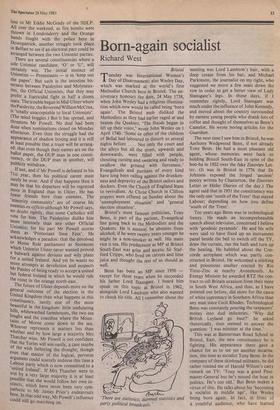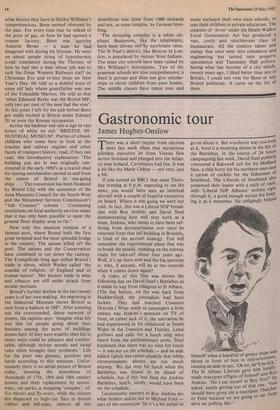Born-again socialist
Richard West
Bristol Tuesday was International Women's Day of Disarmament; also Wesley Day, which was marked at the world's first Methodist Church here in Bristol. The an- niversary honours the date, 24 May 1738, when John Wesley had a religious illumina- tion which now would be called being 'born again'. The Bristol mob disliked the Methodists as they had earlier raged at and beaten the Quakers. 'The floods began to lift up their voice,' wrote John Wesley on 1 April 1740. 'Some or other of the children of Belial had laboured to disturb us several nights before .... Not only the court and the alleys but all the street, upwards and downwards, were filled with people, shouting cursing and swearing and ready to swallow the ground with fierceness.' Evangelicals and puritans of every kind have long been railing against the drunken- ness and depravity of the Bristol sailors and dockers. Even the Church of England leans to revivalism. At Christ Church in Clifton prayers were offered on Sunday about the 'unemployment situation' and 'general election situation'.
Bristol's most famous politician, Tony Benn, is part of the puritan, Evangelical line going back to the Methodists and the Quakers. He is austere; he abstains from alcohol; if he were twenty years younger he might be a non-smoker as well. His main vice is tea. His predecessor as MP at Bristol South-East was grim and ascetic Sir Staf- ford Cripps, who lived on carrots and lime juice and thought the rest of us should as well.
Benn has been an MP since 1950 except for three years when he succeeded his father Lord Stansgate. I heard him speak on this topic at Bristol in 1962, alongside Lord Lambton who also wanted to chuck his title. All I remember about the 'There are statistics, damned statistics and party political broadcasts.' meeting was Lord Lambton's hair, with a deep crease from his hat; and Michael Parkinson, the journalist on my right, who suggested we move a few seats down the row in order to get a better view of Lady Stansgate's legs. In those days, if I remember rightly, Lord Stansgate was much under the influence of John Kennedy, and moved about the country surrounded by earnest young people who drank lots of coffee and thought of themselves as Benn's Camelot. He wrote boring articles for the Guardian.
The next time I saw him in Bristol, he was Anthony Wedgwood Benn, if not already Tony Benn. He had a most pleasant old agent, whose memories went back to holding Bristol South-East in spite of the hoo-ha in 1922 over the fake Zinoviev Let- ter. (It was in Bristol in 1776 that Dr Johnson exposed the forged 'ancient' poetry written by Chatterton, the Zinoviev Letter or Hitler Diaries of the day.) The agent said that in 1931 the constituency was the only one 'south of the Trent' that stayed Labour; depending on how you define `south of the Trent'.
Ten years ago Benn was in technological frenzy. He made an incomprehensible speech about television, concerned I believe with 'geodesic pyramids'. He and his wife were said to have fixed up an instrument panel beside the bed to switch off the TV, draw the curtain, run the bath and turn up the heating. He babbled about the Con- corde aeroplane which was partly con- structed in Bristol. He welcomed a stinking and poisonous smelter erected by Rio Tinto-Zinc at nearby Avonmouth. As Energy Minister he awarded RTZ the con- tract to sell Britain uranium from their mine in South West Africa, and thus, as I have pointed out before, did more for the cause of white supremacy in Southern Africa than any man since Cecil Rhodes. Technological Benn was constantly pouring the taxpayers' money into dud industries. 'Why did British Leyland go bust?' he asked rhetorically, then seemed to answer the question: 'I was minister at the time.'
This was at Bannerman Road School in Bristol, East, the new constituency he is fighting. His appearance there gave a chance for us to see yet another incarna- tion, this time as socialist Tony Benn. In the company of these skinhead militants, he did rather remind me of Harold Wilson's catty remark on TV: 'Tony was a good Post- master-General but he's missed the boat in politics. He's too old.' But Benn makes a virtue of this. He talks about his 'becoming a socialist in middle age', like Wesley being born again. In fact, in front of a youthful audience, who have learned
what history they have in Shirley Williams's comprehensives, Benn seemed obsessed by the past. For every time that he talked of the price of gas, or how he had opened a trouser factory, Benn was quoting Aneurin Bevan — a man he had disagreed with during his lifetime. He went on about people dying of hypothermia (cold: translator) during the Thirties; of how he had met a man whose job was to sack the Great Western Railways staff on Christmas Eve and re-hire them on New Year's Day. He told us a doleful story of some old lady whose grandfather was one of the Tolpuddle Martyrs. He told us that `when Edmund Burke was the Bristol MP, only two per cent of the men had the vote'. At this point I left for the pub before Benn got really excited at Bristol under Edward III or even the Roman occupation.
Across the harbour one sees a sign in vast letters of white on red: 'BRISTOL IN- DUSTRIAL MUSEUM'. Parties of school- children who come here to look at the coaches and railway engines and other facets of transport history, read, if they can read, this introductory explanation: 'The building you are in was originally con- structed in the early 1950's as a transit shed for storing merchandise carried to and from the centre of Bristol in sea-going ships ... The conversion has been financed by Bristol City with the assistance of the Area Museums Council for the South-West and the Manpower Services Commission's "Job Creation" scheme ... Continuing restrictions on local authority services mean that it has only been possible to open the ground floor display area so far.'
Now only this museum remains of a famous port, where Brunel built the first great terminal and the most splendid bridge in the country. The unions killed off the port. The unions and the Conservatives have combined to cut down the railway. The Evangelicals long ago stifled Bristol's trade in slaves, which Wesley called 'the scandal of religion, of England and of human nature'. Her ancient trade in wine and tobacco are still under attack from secular puritans.
Bristol's further decline in the last twenty years is of her own making. An engraving in the Industrial Museum shows Bristol as seen from a balloon in 1887. After pointing out the overcrowded, dense network of streets, the caption says: 'Imagine what life was like for people going about their business among the acres of buildings drawn here. If they were wealthy then life in many ways could be pleasant and comfor- table, although stricter morals and social rules often brought their problems.' Life for the poor was gloomy, pestilent and harsh according to this museum. Unfor- tunately there is no aerial picture of Bristol today, showing the demolition of thousands of 17th, 18th and 19th century houses and their replacement by motor- ways, car-parks, a shopping 'complex', of- fice blocks and fly-overs, while the citizens are dispersed to high-rise flats in distant valleys and hill-sides. Almost all this demolition was done from 1960 onwards and not, as some imagine, by German bom- bing.
The shopping complex is a white ele- phant. Businesses, like the inhabitants, have been driven out by exorbitant rates. The St Paul's district, like Brixton in Lon- don, is populated by riotous West Indians. The inner city schools have been ruined by Mrs Williams's innovations. Two of the grammar schools are now comprehensive; a third is private and does not give scholar- ships to clever children from poor homes. The middle classes have taken over and made exclusive their own state schools, or sent their children to private education. The creation of 'Avon' under the Heath-Walker Local Government Act has produced a vast, costly and mischievous class of bureaucrats. All the creative talent and energy that once went into commerce and engineering has turned into property speculation and Tammany Hall politics. Seeing what has become of a city which, twenty years ago, 1 liked better than any in Britain, I could not vote for Benn or any Bristol politician. A curse on the lot of them.















































 Previous page
Previous page